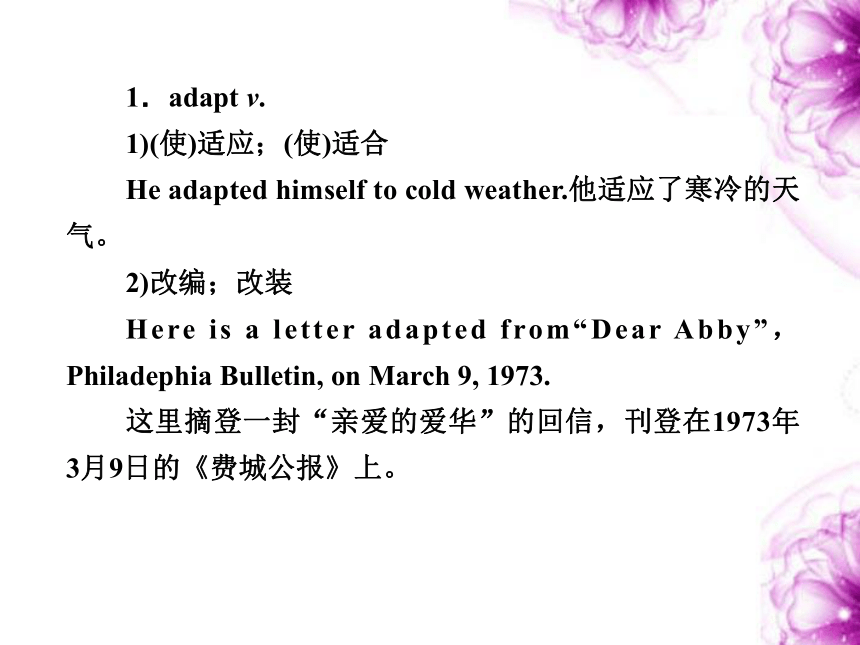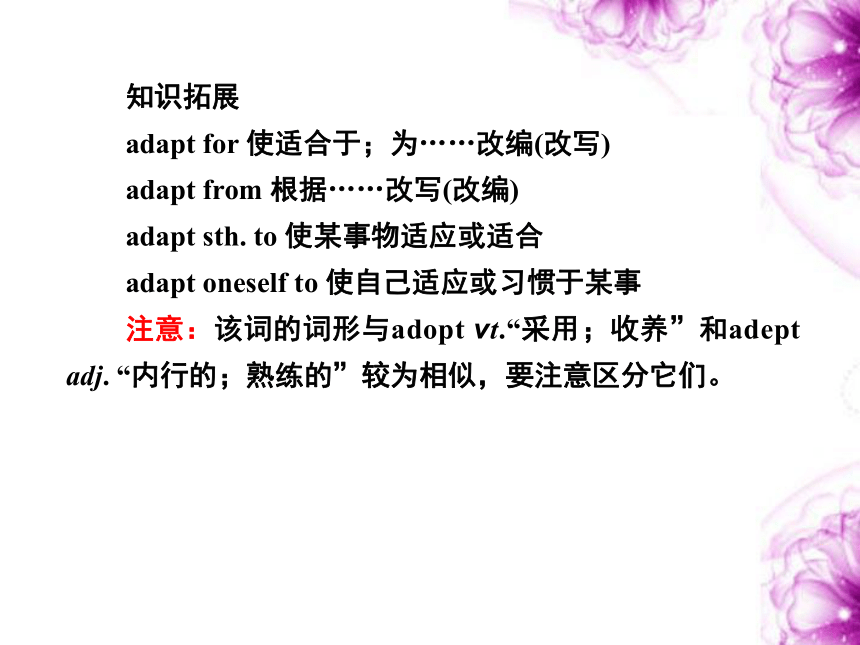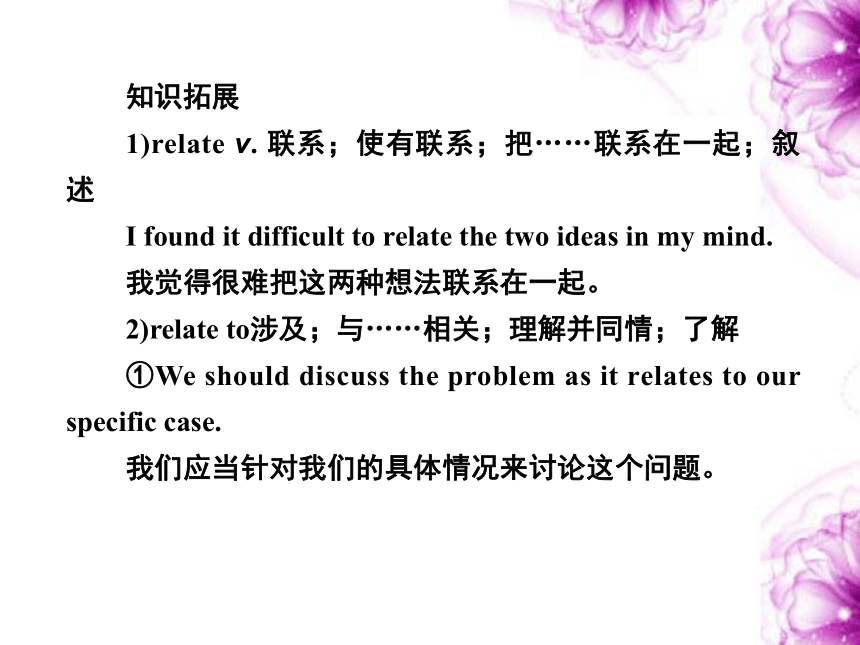高中英语 Module 6 Unexplained Mysteries of the Nature World 第3课时 Grammar同步课件 外研版必修4
文档属性
| 名称 | 高中英语 Module 6 Unexplained Mysteries of the Nature World 第3课时 Grammar同步课件 外研版必修4 |  | |
| 格式 | zip | ||
| 文件大小 | 182.3KB | ||
| 资源类型 | 教案 | ||
| 版本资源 | 外研版 | ||
| 科目 | 英语 | ||
| 更新时间 | 2013-02-21 12:11:33 | ||
图片预览












文档简介
课件33张PPT。1.adapt v.
1)(使)适应;(使)适合
He adapted himself to cold weather.他适应了寒冷的天气。
2)改编;改装
Here is a letter adapted from“Dear Abby”, Philadephia Bulletin, on March 9, 1973.
这里摘登一封“亲爱的爱华”的回信,刊登在1973年3月9日的《费城公报》上。知识拓展
adapt for 使适合于;为……改编(改写)
adapt from 根据……改写(改编)
adapt sth. to 使某事物适应或适合
adapt oneself to 使自己适应或习惯于某事
注意:该词的词形与adopt vt.“采用;收养”和adept adj. “内行的;熟练的”较为相似,要注意区分它们。高考直击
(2009·浙江)The good thing about children is that they ________ very easily to new environments.
A.adapt B.appeal
C.attach D.apply
解析:考查动词词义辨析。adapt“适应”;appeal“吸引;呼吁”;attach“吸附”;apply“申请”。句意:孩子有个好处就是他们很容易适应新的环境。故选A。
答案:A即学即用
When they came to a new country; they found it difficult to________themselves to new circumstances.
A.apply B.accept
C.admit D.adapt
答案:D2.evolve v. 发展;进化;演变
助记evolve①He has evolved his own writing style.
他已形成了自己的写作风格。
②The small company has evolved into a big international firm.
这家小公司已发展成为一家大型的跨国公司。即学即用
Some people believe that we________from the apes.
A.evolved B.came
C.involved D.evolution
答案:A1.be related (to) 和……有联系;和……有关系;有亲属关系
①Much of the crime in this area is related to drug abuse.
这一地区的许多犯罪都与滥用毒品有关。
②Are you related to Mary?
你与玛丽是亲戚吗?知识拓展
1)relate v. 联系;使有联系;把……联系在一起;叙述
I found it difficult to relate the two ideas in my mind.
我觉得很难把这两种想法联系在一起。
2)relate to涉及;与……相关;理解并同情;了解
①We should discuss the problem as it relates to our specific case.
我们应当针对我们的具体情况来讨论这个问题。②The second paragraph relates to the situation in Scotland.
第二段谈到苏格兰的形势。
③Many adults can't relate to children.
许多成年人并不了解儿童的想法。
3)(派)related adj. 有关的;联系的
relatedness n. 有关
relationship n. 关系;关联
relation n. 联系;关联;关系
relativity n. 相对性
relative adj. 有关联的;有关系的即学即用
The matter________your study surely requires________carefully.
A.relating to; dealing with
B.related to; dealt with
C.related to; being dealt with
D.relating to; having dealt with
答案:A2.die out
1)(指宗族、物种)灭绝;灭亡
This kind of bird is dying out.
这种鸟正在濒临灭绝。
2)(习俗等)渐渐消失
Many old customs are gradually dying out.
许多旧习俗正在日渐消失。知识拓展
die away 逐渐停止;逐渐消失
die off 相继死去
die down 逐渐减弱;逐渐模糊;平息;平静
die of... 因……而死(因疾病,饥寒,情感等而死)
die from... 因……而死(因外因而死)
即学即用
The moth's habitat is being destroyed and it has nearly________.
A.died away B.died down
C.died out D.died from
答案:C may/might+have+过去分词:表示对过去发生的动作或存在的状态进行不肯定的推测,即说话人认为过去某事发生的可能性或某状态存在的可能性。可用于肯定句(意思是“可能已经”)和否定句(意思是“可能没有”);might的语气没有may那么肯定。
①He may not have finished the work.
他可能还没有完成那项工作。
②He might not have got your letter.
他或许没有收到你的来信。
③How quickly time passed! It might have happened yesterday.时间过得好快啊!这事好像就发生在昨天。
但有时might可用来表示过去可能发生而没发生的事情。
You were so careless that day. You might have made a bad mistake.
那天你太粗心了,你有可能会犯错误的。(事实上并没有犯错误)知识拓展
其他“情态动词+have+过去分词”的用法
1)“must+have+过去分词”表示对过去的某事做出的肯定判断。
The ground is wet. It must have rained last night.
地面很湿,昨天晚上一定下雨了。
2)“can/could+have+过去分词”表示对过去某种行为或存在的状态进行否定推测。can常用于否定句(意思是“不可能已经”)和疑问句;could除用于否定句及疑问句外,还可用于肯定句(意思是“那时可能;本来可以,但实际并未发生”。)①Don't worry—they could have just forgotten to phone.
别担心——他们很可能只是忘了打电话。
②He cannot have been to that town.
他根本不可能去过那座城市。
③Can he have got the book?
他会有那本书吗?
④The snowstorm was terrible that day. You could have lost your way.
那天暴风雪是可怕的,你本可能会迷路的。(事实上你并没有迷路)3)“need+have+过去分词”常用于否定句,表示过去做了不必做或不需要做的事情或过去做某事纯属多余,含有“根本不必;本来不必”之意,也可用于疑问句。
①You needn't have told them that.
你没有必要告诉他们那个。
②Need they have done it last week?
他们上周做这事有必要吗?4)“should/ought to+have+过去分词”的肯定式表示“过去本应做某事(但实际上却没做)”;其否定表示“过去不该做某事(但却做了)”。含有不满或责备之意。
①You should(ought to)have asked for my permission.
你本应征求我的同意。(事实上,你并没有请求我准许)
②You shouldn't(oughtn't to)have kept the books in the damp place.
你本不应该把那些书放在潮湿的地方。(实际上已放潮湿的地方了。)5)“would+have+过去分词”表示过去本来要做某事却因某种原因未做,通常用来说明某种情况,但不像用should或ought to那样含有责备之意。
I would have written to you earlier but I have been ill.
我本来要早点给你写信的,但我生病了。高考直击
(1)(2008·重庆)—I can't find my purse anywhere.
—You________have lost it while shopping.
A.may B.can
C.should D.would
解析:本题主要考查情态动词在虚拟语气中的用法。句意为:“——我到处都找不到钱包”。“——你也许在购物时把它丢了”。肯定句中对过去情况的推测应用may/might have done而can/should have done多表对过去能/该做而未做的事情的一种责备或不满,would have done表推测时多用于否定句中或表示“当时就做……了”。
答案:A(2)(2008·天津)She________have left school, for her bike is still here.
A.can't B.wouldn't
C.shouldn't D.needn't
解析:考查情态动词表推测的用法。句意:她一定还没有离校,她的自行车还在。can用于否定句,表示某事肯定不真实。其它三项都不表推测。
答案:A(3)(2008·江西)What a pity. Considering his ability and experience, he________better.
A.need have done B.must have done
C.can have done D.might have done
解析:考查情态动词与虚拟语气。what a pity表明了一种遗憾的语气。句意为“太可惜了!就能力和经验而言,他应该/或许/一定会做得更好些的。”A明显不正确:B项与上文矛盾,C项中表达虚拟语气应把can改为could,表示对过去的事情进行推测;只有D项might表示对过去的事情的肯定的推测,意为“或许”。
答案:D(4)(2010·山东卷,25)I________have watched that movie—it'll give me horrible dreams.
A.shouldn't B.needn't
C.couldn't D.mustn't
解析:句意:我不该看那部电影的,那会让我做噩梦。考查情态动词。shouldn't“不应该”;needn't“不必”;couldn't“不可能”;mustn't不与have done连用。
答案:A(5)(2008·江苏)—She looks very happy. She________have passed the exam.
—I guess so. It's not difficult after all.
A.should B.could
C.must D.might
解析:对过去事情的推测用must have done.
答案:C(6)(2010·天津卷,9)Mark________have hurried.After driving at top speed, he arrived half an hour early.
A.needn't B.wouldn't
C.mustn't D.couldn't
解析:句意:迈克没有必要急急忙忙。高速行驶之后,他提前半小时到达了。needn't have done表示“本不必干某事而干了”;wouldn't have done表示与过去事实相反的虚拟语气;must have done表示对过去事实的肯定推测,此结构不能用于否定式;couldn't have done表示对过去事实的否定推测。根据句意A项正确。
答案:A(7)(2010·安徽卷,32)Jack described his father, who________a brave boy many years ago, as a strong-willed man.
A.would be B.would have been
C.must be D.must have been
解析:句意:杰克把多年以前是个勇敢男孩的父亲描述成一个意志坚强的人。表示对过去情况的推测,要用must have done结构,故选D。
答案:D
1)(使)适应;(使)适合
He adapted himself to cold weather.他适应了寒冷的天气。
2)改编;改装
Here is a letter adapted from“Dear Abby”, Philadephia Bulletin, on March 9, 1973.
这里摘登一封“亲爱的爱华”的回信,刊登在1973年3月9日的《费城公报》上。知识拓展
adapt for 使适合于;为……改编(改写)
adapt from 根据……改写(改编)
adapt sth. to 使某事物适应或适合
adapt oneself to 使自己适应或习惯于某事
注意:该词的词形与adopt vt.“采用;收养”和adept adj. “内行的;熟练的”较为相似,要注意区分它们。高考直击
(2009·浙江)The good thing about children is that they ________ very easily to new environments.
A.adapt B.appeal
C.attach D.apply
解析:考查动词词义辨析。adapt“适应”;appeal“吸引;呼吁”;attach“吸附”;apply“申请”。句意:孩子有个好处就是他们很容易适应新的环境。故选A。
答案:A即学即用
When they came to a new country; they found it difficult to________themselves to new circumstances.
A.apply B.accept
C.admit D.adapt
答案:D2.evolve v. 发展;进化;演变
助记evolve①He has evolved his own writing style.
他已形成了自己的写作风格。
②The small company has evolved into a big international firm.
这家小公司已发展成为一家大型的跨国公司。即学即用
Some people believe that we________from the apes.
A.evolved B.came
C.involved D.evolution
答案:A1.be related (to) 和……有联系;和……有关系;有亲属关系
①Much of the crime in this area is related to drug abuse.
这一地区的许多犯罪都与滥用毒品有关。
②Are you related to Mary?
你与玛丽是亲戚吗?知识拓展
1)relate v. 联系;使有联系;把……联系在一起;叙述
I found it difficult to relate the two ideas in my mind.
我觉得很难把这两种想法联系在一起。
2)relate to涉及;与……相关;理解并同情;了解
①We should discuss the problem as it relates to our specific case.
我们应当针对我们的具体情况来讨论这个问题。②The second paragraph relates to the situation in Scotland.
第二段谈到苏格兰的形势。
③Many adults can't relate to children.
许多成年人并不了解儿童的想法。
3)(派)related adj. 有关的;联系的
relatedness n. 有关
relationship n. 关系;关联
relation n. 联系;关联;关系
relativity n. 相对性
relative adj. 有关联的;有关系的即学即用
The matter________your study surely requires________carefully.
A.relating to; dealing with
B.related to; dealt with
C.related to; being dealt with
D.relating to; having dealt with
答案:A2.die out
1)(指宗族、物种)灭绝;灭亡
This kind of bird is dying out.
这种鸟正在濒临灭绝。
2)(习俗等)渐渐消失
Many old customs are gradually dying out.
许多旧习俗正在日渐消失。知识拓展
die away 逐渐停止;逐渐消失
die off 相继死去
die down 逐渐减弱;逐渐模糊;平息;平静
die of... 因……而死(因疾病,饥寒,情感等而死)
die from... 因……而死(因外因而死)
即学即用
The moth's habitat is being destroyed and it has nearly________.
A.died away B.died down
C.died out D.died from
答案:C may/might+have+过去分词:表示对过去发生的动作或存在的状态进行不肯定的推测,即说话人认为过去某事发生的可能性或某状态存在的可能性。可用于肯定句(意思是“可能已经”)和否定句(意思是“可能没有”);might的语气没有may那么肯定。
①He may not have finished the work.
他可能还没有完成那项工作。
②He might not have got your letter.
他或许没有收到你的来信。
③How quickly time passed! It might have happened yesterday.时间过得好快啊!这事好像就发生在昨天。
但有时might可用来表示过去可能发生而没发生的事情。
You were so careless that day. You might have made a bad mistake.
那天你太粗心了,你有可能会犯错误的。(事实上并没有犯错误)知识拓展
其他“情态动词+have+过去分词”的用法
1)“must+have+过去分词”表示对过去的某事做出的肯定判断。
The ground is wet. It must have rained last night.
地面很湿,昨天晚上一定下雨了。
2)“can/could+have+过去分词”表示对过去某种行为或存在的状态进行否定推测。can常用于否定句(意思是“不可能已经”)和疑问句;could除用于否定句及疑问句外,还可用于肯定句(意思是“那时可能;本来可以,但实际并未发生”。)①Don't worry—they could have just forgotten to phone.
别担心——他们很可能只是忘了打电话。
②He cannot have been to that town.
他根本不可能去过那座城市。
③Can he have got the book?
他会有那本书吗?
④The snowstorm was terrible that day. You could have lost your way.
那天暴风雪是可怕的,你本可能会迷路的。(事实上你并没有迷路)3)“need+have+过去分词”常用于否定句,表示过去做了不必做或不需要做的事情或过去做某事纯属多余,含有“根本不必;本来不必”之意,也可用于疑问句。
①You needn't have told them that.
你没有必要告诉他们那个。
②Need they have done it last week?
他们上周做这事有必要吗?4)“should/ought to+have+过去分词”的肯定式表示“过去本应做某事(但实际上却没做)”;其否定表示“过去不该做某事(但却做了)”。含有不满或责备之意。
①You should(ought to)have asked for my permission.
你本应征求我的同意。(事实上,你并没有请求我准许)
②You shouldn't(oughtn't to)have kept the books in the damp place.
你本不应该把那些书放在潮湿的地方。(实际上已放潮湿的地方了。)5)“would+have+过去分词”表示过去本来要做某事却因某种原因未做,通常用来说明某种情况,但不像用should或ought to那样含有责备之意。
I would have written to you earlier but I have been ill.
我本来要早点给你写信的,但我生病了。高考直击
(1)(2008·重庆)—I can't find my purse anywhere.
—You________have lost it while shopping.
A.may B.can
C.should D.would
解析:本题主要考查情态动词在虚拟语气中的用法。句意为:“——我到处都找不到钱包”。“——你也许在购物时把它丢了”。肯定句中对过去情况的推测应用may/might have done而can/should have done多表对过去能/该做而未做的事情的一种责备或不满,would have done表推测时多用于否定句中或表示“当时就做……了”。
答案:A(2)(2008·天津)She________have left school, for her bike is still here.
A.can't B.wouldn't
C.shouldn't D.needn't
解析:考查情态动词表推测的用法。句意:她一定还没有离校,她的自行车还在。can用于否定句,表示某事肯定不真实。其它三项都不表推测。
答案:A(3)(2008·江西)What a pity. Considering his ability and experience, he________better.
A.need have done B.must have done
C.can have done D.might have done
解析:考查情态动词与虚拟语气。what a pity表明了一种遗憾的语气。句意为“太可惜了!就能力和经验而言,他应该/或许/一定会做得更好些的。”A明显不正确:B项与上文矛盾,C项中表达虚拟语气应把can改为could,表示对过去的事情进行推测;只有D项might表示对过去的事情的肯定的推测,意为“或许”。
答案:D(4)(2010·山东卷,25)I________have watched that movie—it'll give me horrible dreams.
A.shouldn't B.needn't
C.couldn't D.mustn't
解析:句意:我不该看那部电影的,那会让我做噩梦。考查情态动词。shouldn't“不应该”;needn't“不必”;couldn't“不可能”;mustn't不与have done连用。
答案:A(5)(2008·江苏)—She looks very happy. She________have passed the exam.
—I guess so. It's not difficult after all.
A.should B.could
C.must D.might
解析:对过去事情的推测用must have done.
答案:C(6)(2010·天津卷,9)Mark________have hurried.After driving at top speed, he arrived half an hour early.
A.needn't B.wouldn't
C.mustn't D.couldn't
解析:句意:迈克没有必要急急忙忙。高速行驶之后,他提前半小时到达了。needn't have done表示“本不必干某事而干了”;wouldn't have done表示与过去事实相反的虚拟语气;must have done表示对过去事实的肯定推测,此结构不能用于否定式;couldn't have done表示对过去事实的否定推测。根据句意A项正确。
答案:A(7)(2010·安徽卷,32)Jack described his father, who________a brave boy many years ago, as a strong-willed man.
A.would be B.would have been
C.must be D.must have been
解析:句意:杰克把多年以前是个勇敢男孩的父亲描述成一个意志坚强的人。表示对过去情况的推测,要用must have done结构,故选D。
答案:D
